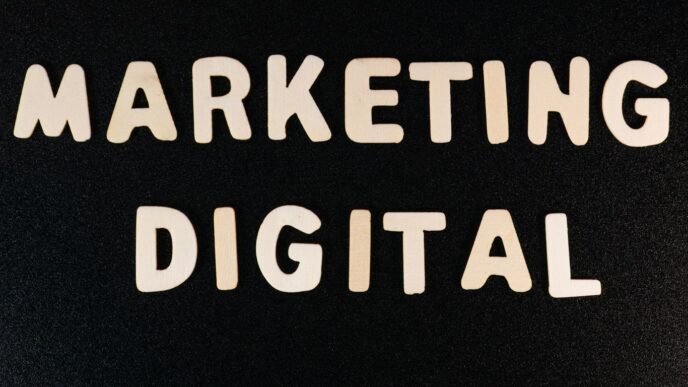We’ve all heard the phrase ‘one stop shop.’ It’s meant to convey convenience and a complete range of services. But honestly, it’s become a bit of a cliché. Sometimes it feels like everyone and their dog is a ‘one stop shop’ for something. This can make it hard to really stand out and communicate what makes your business special. Let’s explore some better ways to say it, focusing on what truly matters to your customers and what your business actually does.
Key Takeaways
- The term ‘one stop shop’ is overused and can lack specific meaning.
- Using clearer language helps communicate value directly to customers.
- Focus on what your business offers, like integrated solutions or full-spectrum support.
- Highlight the benefits for the customer, such as a streamlined experience or easy access.
- Consider industry-specific terms that better describe your capabilities.
Finding Clearer Alternatives to ‘One Stop Shop’
We’ve all heard it, and maybe even used it ourselves: the phrase "one stop shop." It sounds convenient, right? Like you can get everything you need all in one place. But honestly, it’s become a bit of a cliché in the business world. It’s so common that it often loses its impact, and sometimes, it doesn’t really tell us much about what the business actually does.
Why ‘One Stop Shop’ Can Be Problematic
Using vague language can actually make people trust your message less. When we rely on overused phrases like "one stop shop," we’re not being specific. It’s like saying "good job" instead of pointing out exactly what was done well. It might be easy shorthand, but it doesn’t really communicate value clearly. Think about it: does it really mean they have every single product, or just a good selection? The ambiguity can lead to confusion, and nobody wants that.
The Need for Precise Language
Getting to the point with clear language is key. Instead of relying on tired buzzwords, we should aim to be more direct. It’s about making sure your audience understands exactly what you mean, without any guesswork. This helps build trust and makes your message more memorable. As one writer put it, "Many examples of corporate jargon are overused and imprecise. Substituting more specific alternatives will make a more compelling case to your audience."
Communicating Value Effectively
So, how do we get better at this? It starts with thinking about what we’re really trying to say. Are we trying to say that a business offers a lot of different services? Or that they make things easy for the customer? Focusing on the actual benefit or capability, rather than a generic phrase, is much more effective. For instance, instead of "one stop shop," you might say a business provides integrated solutions or a streamlined customer experience. It paints a clearer picture and tells people what they really need to know.
Describing Comprehensive Services
Sometimes, you need to tell people you do a lot of things, all under one roof. "One stop shop" is what people say, but it’s a bit tired, right? Let’s look at ways to say you’ve got it all covered, but in a way that actually sounds good.
Holistic Service Providers
This phrase suggests that you look at the whole picture when helping clients. Instead of just fixing one small part of a problem, you consider how everything fits together. It’s about providing support that touches on all the important aspects of a client’s needs. Think of it like a doctor who doesn’t just treat a symptom but looks at your overall health. We aim to be that kind of partner for our clients, offering support that covers all the bases.
Integrated Solutions
When you offer integrated solutions, it means different services or products work together smoothly. They aren’t just separate things you happen to sell; they’re designed to connect and work as a unit. This makes things easier for the customer because they don’t have to figure out how to make different parts work together. It’s like getting a computer system where all the software and hardware are already set up to play nice with each other. We build these kinds of connected systems for our clients.
All-Encompassing Offerings
This is a straightforward way to say you cover a wide range of needs. It implies that clients won’t need to look elsewhere for related services because you have them covered. It’s about being the main place someone goes for a complete set of needs. For example, a business might offer all-encompassing services for starting a new company, from legal setup to marketing. It means you’ve thought about what a client might need from start to finish. You can find a good example of this kind of centralized information hub in a client portal.
Here’s a quick look at what this means:
- Holistic: Addresses the entire situation, not just one part.
- Integrated: Different parts work together smoothly.
- All-Encompassing: Covers a wide variety of related needs.
Choosing the right words helps people understand exactly what you do and why it’s good for them. It’s about being clear and showing the real benefit of having everything in one place.
Focusing on Customer Benefits
When we talk about what a business offers, it’s easy to get caught up in the features or the services themselves. But really, what matters most to the people using those services? It’s how those services make their lives easier or better. That’s where focusing on customer benefits comes in. Instead of just saying you’re a ‘one stop shop,’ let’s think about what that actually means for the person on the other end.
Streamlined Customer Experience
Nobody likes a complicated process. When a business can handle multiple needs without the customer having to jump through hoops, that’s a huge win. Think about it: instead of contacting three different people for three different things, you only need to talk to one. This saves time, reduces confusion, and generally makes the whole interaction feel smoother. It’s about making things simple and predictable for the customer.
- Less time spent managing multiple vendors.
- Reduced back-and-forth communication.
- A clearer understanding of who to contact for what.
Convenient Access to All Needs
Imagine needing a few different things for a project. If one place can provide all of them, it’s incredibly convenient. You don’t have to research and vet multiple providers. This convenience means customers can get what they need, when they need it, all from a single point of contact. It simplifies planning and execution, letting customers focus on their main goals rather than the logistics of acquiring resources.
Simplified Procurement
Buying things can be a hassle. When a business consolidates services, it often means a simpler purchasing process. Instead of multiple contracts, invoices, and payment schedules, there might be just one. This makes budgeting and tracking expenses much easier for the customer. It cuts down on administrative work, freeing up valuable time and resources that can be put to better use elsewhere. It’s about making the financial and administrative side of doing business less of a headache.
Highlighting Business Capabilities
When you’re trying to explain what your business does, using vague terms like "one stop shop" can really fall flat. It doesn’t tell people what you’re actually good at. Instead, focus on what your company can do for clients. Think about the specific skills and services you provide. Clearly stating your capabilities helps potential customers understand the value you bring.
Here are a few ways to describe what your business offers, focusing on what you can do:
Full-Spectrum Support
This phrase suggests you cover all the bases. It implies that no matter what a client needs within your area of business, you have the resources and knowledge to handle it. It’s about providing assistance across the entire range of a project or service.
- Planning: Helping clients map out their goals.
- Execution: Carrying out the necessary steps to achieve those goals.
- Maintenance: Ongoing support and upkeep after the initial work is done.
End-to-End Solutions
This emphasizes that you manage a process from beginning to end. It means clients don’t have to worry about handing off tasks or coordinating with multiple vendors. You handle everything involved in a particular service or product lifecycle. For example, a company offering end-to-end IT services might handle everything from initial setup and software installation to ongoing network management and security updates. This is a great way to show you manage the whole process, which can be a big relief for clients who want to avoid the hassle of piecing things together themselves. It’s about providing a complete package that takes care of all the details, from the very first step to the final outcome. This approach can really simplify things for your clients, making it easier for them to achieve their objectives without getting bogged down in the minutiae. It’s about taking ownership of the entire journey.
Comprehensive Business Services
This term highlights the breadth of services your business provides. It communicates that you offer a wide array of solutions designed to meet various business needs. Instead of just one or two things, you offer a full suite. This can include things like financial planning, marketing strategy, operational management, and human resources support, all under one roof. It shows that you understand the different facets of running a business and are equipped to assist with them. It’s about being a partner that can help with many different aspects of a client’s operations, not just a single task. This can be particularly appealing to smaller businesses that may not have dedicated departments for each of these functions. It’s about providing a complete package that addresses multiple needs, making your business a go-to resource for a variety of challenges. This kind of broad capability can be a real advantage for clients looking to streamline their operations and work with fewer external partners. It’s about offering a complete set of tools and knowledge to help businesses succeed in all areas. You can find more about managing different aspects of business operations by looking into field service management.
Alternatives for Specific Industries
When you’re talking about your business, especially in a specific field, using generic terms like "one stop shop" can fall flat. It’s like trying to use a hammer for every job – sometimes it works, but often you need the right tool. Let’s look at how we can be more precise depending on what industry you’re in.
Unified Platform for Technology
In the tech world, a "one stop shop" often means a single system or software that handles multiple functions. Instead of saying you’re a one stop shop, you could say you provide a unified platform that integrates various tools or services. This highlights the interconnectedness and efficiency of your tech solution. Think about it: instead of juggling five different apps, your clients use one system that does it all. It’s about making complex tech feel simple and manageable for the user.
- Integrated Software Suite: For businesses offering a collection of software that works together seamlessly.
- All-in-One Solution: A straightforward term for a product or service that covers all necessary aspects.
- Centralized System: Emphasizes a single point of control and access for various technological functions.
Complete Resource for Marketing
For marketing agencies or consultants, being a "one stop shop" means handling everything from strategy to execution. A better way to phrase this is to call yourself a complete resource for marketing. This implies you have all the knowledge, tools, and services needed to guide a client’s campaign from start to finish. It suggests a depth of capability beyond just offering a bundle of services; it means you’re the go-to place for all marketing needs.
- Full-Service Marketing Partner: Highlights that you work alongside clients as a dedicated team.
- End-to-End Campaign Management: Focuses on the entire lifecycle of a marketing campaign.
- Holistic Marketing Support: Suggests a broad and interconnected approach to all marketing activities.
All-Inclusive Package for Clients
In client-facing industries like hospitality, travel, or even consulting, the idea of a "one stop shop" translates to providing everything a client might need in one go. Using all-inclusive package for clients is a more descriptive and appealing alternative. It directly communicates that the client gets a complete, bundled offering without needing to seek out additional services elsewhere. This term sets clear expectations and emphasizes convenience and value for the customer.
- Bundled Service Offering: Clearly states that multiple services are grouped together.
- Turnkey Client Solution: Implies a ready-to-go package that requires minimal client input to start.
- Comprehensive Client Support: Focuses on the breadth of assistance provided to meet client needs.
Emphasizing Efficiency and Completeness
Sometimes, you just need a business to handle everything. You don’t want to jump between different providers for different parts of a project. That’s where phrases that highlight a company’s ability to manage the whole process come in handy. They tell customers that this business can take care of things from start to finish, making life easier.
Think about it: instead of saying a company is a ‘one stop shop,’ you could say they offer consolidated service delivery. This sounds more professional and clearly states that all services are grouped together. It suggests a streamlined process where you don’t have to repeat yourself or manage multiple contracts. It’s about getting everything done in one place, efficiently.
Here are a few ways to get that message across:
- Unified Approach to Client Needs: This phrase emphasizes that the business understands all aspects of a client’s requirements and addresses them cohesively. It’s not just about having many services, but about how those services work together for the client’s benefit.
- Complete Business Solutions Provider: This directly states that the company can handle all the necessary business functions for a client. It implies a thoroughness and a commitment to seeing a client’s needs fully met.
- End-to-End Service Management: This highlights the company’s capability to manage a process or project from its very beginning all the way to its conclusion. It’s about taking full responsibility and providing a continuous, unbroken chain of service. This is particularly useful when discussing complex projects or ongoing support, like managing a point of sale system [fa14].
Using these kinds of phrases helps customers understand that they can rely on a single entity to manage their needs completely, saving them time and hassle.
Wrapping It Up
So, we’ve talked a lot about those common phrases we all use at work, the ones that sound fancy but often just confuse people. It turns out, a lot of these buzzwords, like ‘one-stop shop,’ are just shortcuts that don’t always land right. The main idea is pretty simple: just say what you mean. If there’s a clearer, more direct way to get your point across, use that. It helps everyone understand, and honestly, it just makes conversations smoother. Think about your audience, keep it plain, and you’ll probably communicate a lot better.
Frequently Asked Questions
Why is ‘one stop shop’ not a great phrase to use?
‘One stop shop’ can sound a bit old-fashioned and doesn’t clearly explain what a business does. It’s like saying ‘everything under one roof’ without telling people what ‘everything’ actually is. Using more specific words helps customers understand exactly what you offer and why it’s good for them.
What’s a better way to say a business offers many services?
Instead of ‘one stop shop,’ you could say a business provides ‘integrated solutions’ or ‘holistic services.’ You could also describe it as offering ‘all-encompassing support’ or ‘complete business services.’ These phrases sound more professional and give a clearer picture of what the company does.
How can I talk about the customer’s experience?
When a business offers many services, it makes things easier for customers. You can say it provides a ‘streamlined customer experience’ or ‘convenient access to all your needs.’ This highlights how the business helps customers by making things simpler and more straightforward for them.
What if I want to focus on what the business can do?
You can talk about the company’s capabilities by using phrases like ‘full-spectrum support’ or ‘end-to-end solutions.’ This shows that the business can handle everything from start to finish, covering all the different parts of a project or customer need.
Are there different phrases for different types of businesses?
Yes, definitely! For a tech company, you might say ‘unified platform.’ For a marketing business, ‘complete resource’ works well. For client services, an ‘all-inclusive package’ sounds fitting. Choosing the right words depends on what the business actually does.
What’s the main goal when choosing new words?
The main goal is to be clear and help people understand your message. Instead of using common but vague phrases, pick words that accurately describe what you do or the benefits you offer. This makes it easier for your audience to grasp your point and trust what you’re saying.












